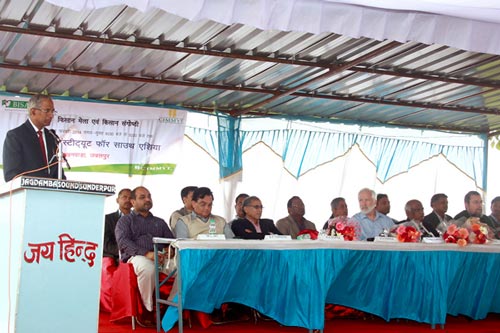By Raj Kumar Jat, M.L. Jat, R. Valluru, Raju Singh, Nikhil Singh, Jagman Dhillon and Raj Gupta/CIMMYT
A day-long “FarmFest” hosted by the Borlaug Institute for South Asia (BISA) allowed farmers to interact directly with researchers on issues including new planting machines, cultivar choices for early, timely and late planting, weed management options and crop diversification.
During the “Take it to the Farmers – FarmFest” event on 22 February, BISA showcased innovative, farmer-friendly sustainable intensification options. The trials focus on increasing yields using timely planting and increased nutrient inputs; increasing cropping intensity by using short season cultivars, relay and inter-cropping; and mechanization and marketing by substituting highvalue commodities for those that fetch lower prices. Farmers were shown soil conservation measures such as gully plugs, check dams and temporary structures to store rainwater, which reduce negative environmental impact and contribute to natural capital of environmental services.
About 1,500 farmers came from 7 districts to collect information and see the performance of 1,500 bread and durum wheat genotypes grown through new BISA shuttle breeding efforts. The efforts include collaboration among the Indian Agricultural Research Institute (IARI)-New Delhi, Punjab Agricultural University (PAU)- Ludhiana and CIMMYT-Mexico. The Jawaharlal Nehru Krishi VishwaVidyalaya University (JNKVV) agreed to participate next season.

The BISA research farm was established in November 2011 in a cotton production region that suffers from land degradation, large yield gaps and low cropping intensity. The farm’s successful conservation agriculture (CA) platform is attracting the attention of the Madhya Pradesh farmers. Scientists grow rice, wheat, maize, Indian mustard, pigeon pea and soybean without plowing or burning crop residues. Production on the 223-hectare farm is improving every season and costs are going down with the CA practices.
Many visiting farmers said they have watched the BISA farm evolve from their “pasture backyard to a granary.” They now want BISA to train them in CA and help them procure appropriate machinery. Ramlal Vishkarma of Sonpur village, whose son is a temporary worker on the BISA farm, said CA saves him US $26 to 32 per hectare each season in planting costs. He also stated that surface mulching helps conserve soil moisture and control cracks in black soils on his farm. In collaboration with JNKVV, the Directorate of Weed Science Research (DWSR), the State Agriculture Department and the seed company JPCL, BISA is promoting resource-conserving no-till agriculture to avoid residue burning, conserve ground water aquifers and provide “seeds of needs” to resource-poor smallholder farmers.
Participants were addressed by CIMMYT director general Thomas Lumpkin; V.S. Tomar, vice chancellor of JNKVV; S.K. Rao, JNKVV dean of faculty; and B.P. Tripathi, joint director of agriculture for the Government of Madhya Pradesh. Raj Kumar Jat and the BISA team coordinated visits for stakeholders to research and production plots. JNKVV volunteers explained new farm implements while M.L. Jat, Raj Kumar, Ravi Valluru, Raju Singh, Jagman Dhillon, Nikhil Singh and others discussed significant results of their research trials.
Tomar emphasized the need to develop climate-resilient, high-yielding varieties and recommended the promotion of low-cost sustainable intensification practices to improve farmers’ economic conditions. He appreciated the efforts of BISA-CIMMYT in introducing CA-based systems. Lumpkin encouraged farmers to adopt cost-saving technologies that offset ever-increasing input costs and low profits from farm outputs, adding that CA-based management practices buffer the negative effects of climatic extremes. He urged farmers to visit BISA regularly and tell researchers what would directly benefit them. M.L. Jat, CIMMYT senior cropping systems agronomist, facilitated a question-and-answer session between farmers and experts from BISA, DSWR and JNKVV.
Farmers’ feedback will help shape future research priorities at BISA, such as the need to bridge large management yield gaps, mechanization, weed management, soil moisture conservation, improved maize and wheat cultivars, quality seeds and training on new machinery and technologies
 Capacity development
Capacity development